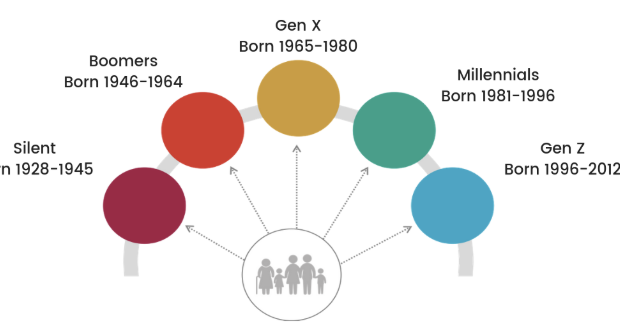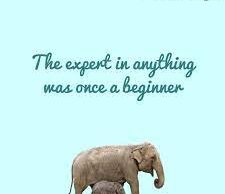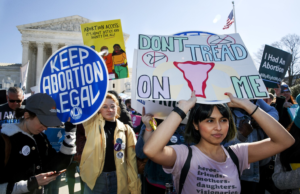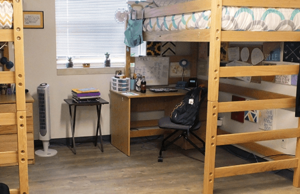How different generations cope with trauma

For this article, we are looking at how these generations have dealt with large traumatic events. Each generation had a mass trauma in their lifetimes, and it is important to see how our response to trauma as Americans has evolved so we can keep evolving and become better.
I asked teachers what historical events they lived through as a teen and how they dealt with the experience and or trauma of the situation. Here were their responses in order of generation from baby boomers to millennials.
At the beginning of our timeline, we have the Baby Boomers, including many of our grandparents and teachers, a generation that lived through a good part of our textbooks, including the assassinations in the ’60s:
“I was 7 when JFK was killed. I remember being very scared because the adults in my life were clearly shocked. I remember school was let out early so we could be home with our family, so the view then was that the school was not the place to help kids address shocks in their lives. It was the parent’s job. I remember my mother crying. I remember people saying it was the Communists, and we might go to war soon. I don’t remember anyone speaking directly to me about my feelings or thoughts. I was 12 when MLK and Robert Kennedy were killed. Again I don’t remember anyone (teachers or parents) talking to us directly about what was happening, their fears or how we were feeling or thinking. I do remember a lot of talk about the riots that happened after MLK was killed with a lot of nasty comments made about blacks. This kind of surprised me as I had been taught in church that MLK was a Man of God and a Man of Peace. I grew up in a rather diverse community (for Iowa in the 60s). My class was about 25 percent Black. This was the first time I remember such clear and open negative comments made about Blacks. I remember personally feeling like our country was falling apart. With three important people killed in my short memory, I remember feeling unsure of what was going to happen next. I don’t remember anyone (school or parent) directly checking with me about what I was feeling or thinking.”
Next up, another Boomer recalls Sept. 11:
“I was an adult in my 40s when 9-11 happened. I was working in social work with troubled teens and had knowledge of trauma, so I viewed it from that lens. What surprised me, and I remember so clearly, was that the teens were not that surprised and seemed to take it better than most of the adults at the facility. Then we realized that these teens had been experiencing trauma most of their lives from abuse, neglect and effects of substance use. This was just another really bad thing to happen in their lives. We all had to learn together to identify ways we could be useful locally, which we decided was the only good thing we could do to help. I remember some teens asking to learn more about Islam so they could understand things being talked about on news and media.”
The Boomer generation had a more community-based healing set. They stood in communities and healed together.
Next in our timeline, we have Gen X; these are our parents, co-workers and our teachers. They lived through a good amount of history and helped shape our generation, and this generation was also there for the terrorist horrors of 2001.
“Sept. 11, I made sure to talk with family and friends often. I made sure to turn off news coverage after a few hours and try to rest/relax.”
Another Gen X teacher saw a pattern in the trauma. “The issues I had to deal with were based more on fear and ignorance such as the AIDS fear or the fear of communism taking over the world. The trauma of the attack on 9/11 was not more of a healing process for people in the nation, but again was not something that a certain behavior on my part would solve or make go away. I have just sort of worked through the issues on my own.”
It seems that Gen X was more fond of healing in private rather than in public, more closed off in quiet.
And the final part of our timeline is millennials. These members are our older siblings, cousins and, again, teachers. They’re a bit older than us and have experienced a lot more. This millennial teacher was also impacted by Sept. 11.
“9/11. I was almost 16 when it happened. It was very odd because the only other big things I remember happening were Columbine and Hurricane Andrew, but in my underdeveloped brain, those didn’t impact me or anyone I knew directly, so they weren’t a huge deal in my life. I remember hearing about the first plane hitting one of the towers on the radio as I was getting ready for the day. I spent most of the day watching the television with my mom and talking to my best friend on the phone. That first day, there wasn’t a lot of processing, just shock over the whole situation. There was also panic because when my mom and I were at the grocery store, the cashier told us that they would be hiking up gas prices to $4/gallon (it was just over $1/gallon at that time), so we quickly went to fill our tanks and likely call others who needed to do the same. For the most part, this didn’t have a huge impact on my life. I wasn’t traveling or working in a field that would be influenced by this. Heck, I was even homeschooled, so it’s not like I had a history class to talk about it in or learn more about the reasons behind it. I do remember a significant influx of pride in our country—lots of people were buying American flags (but make sure to buy ones that said they were made in the U.S. to help support our economy while dealing with the aftermath), and there were lots of things on TV promoting unity like commercials or celebrities coming together to say something encouraging. That unity didn’t extend to everyone, though. I do remember how unfairly scapegoated those of the Muslim faith or who looked to be Middle-Eastern were. There was a lot of mistrust due to over-reaching generalizations and stereotyping. My mom mentioned that there was a Middle-Eastern family that moved out overnight just down the street from my grandparents. The false assumption was they were somehow connected, but much more likely is that they feared for the reactions from other people who were too close-minded to see people as unique individuals. We also lived one town over from a major Islamic center, so disgustingly, people felt we’d be safe because they wouldn’t bomb the area. Television was mostly coverage of the attacks for the rest of the week, but after that, normal life essentially resumed, at least for me. Fear crept back in every so often when a tape would be released by Osama bin-Laden and there was an air of overall uncertainty as to our safety.”
Millennials were a generation that came together to heal. They had the internet so they were the first generation that could really come together and connect, and that is where we come in. Our narrative isn’t here yet because we haven’t had time to process this trauma. It’s still happening, but with these examples, we will be one step closer to healing when it’s over.









You must be logged in to post a comment Login